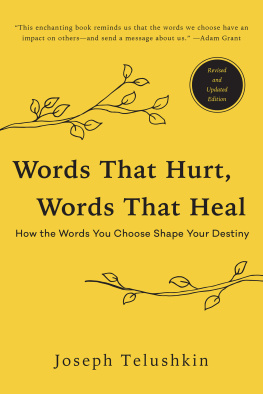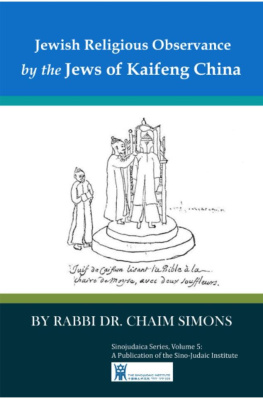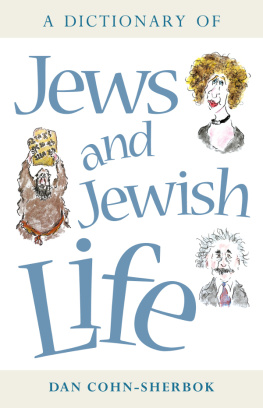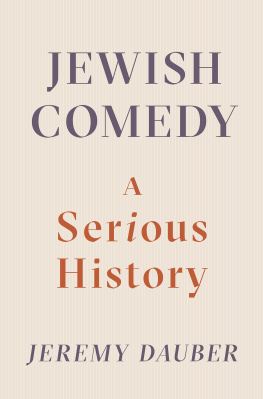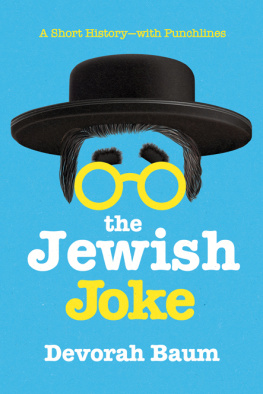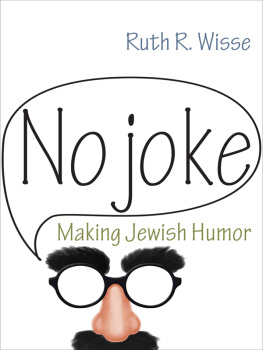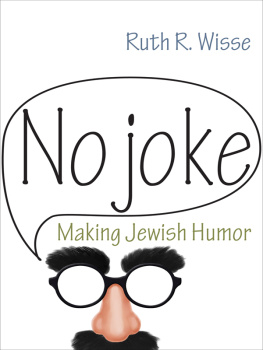What Is Jewish About Jewish Humor?
W hen the first-century Rabbi Hillel was asked by a would-be convert to define the essence of Judaism while standing on one foot, he told the man, What is hateful unto you, dont do unto your neighbor. The rest is commentary; now go and study. Some two thousand years later, Israeli Rabbi Shlomo Lorincz related Hillels response to American economist Milton Friedman, then serving as an adviser to the Israeli government, and asked if he could summarize economics in one sentence. Yes, replied Friedman. There is no such thing as a free lunch.
Is there one sentence that can capture the essence of Jewish humor? Im afraid not. How could one statement encompass jokes about Jewish mothers, reckless and rude drivers in Israel, and antisemites? As I hope to make apparent, Jewish humor reveals a great many truths about the Jews, but no one great truth. Indeed, 150 years of Jewish jokes, and 2,000 years of folklore and witticisms, have the uncanny ability to express truths that sociological or other academic studies usually miss.
A caveat: An analysis of the Jews based on humor and folklore alone necessarily leaves out some important topics. Nothing in these pages reflects Judaisms understanding of Gods omnipotence, or why Jews believe they were chosen by God, or the Jewish position on birth control. I would gladly have included these subjects had I found jokes about them, but I didnt.
Many other important topics are the subject of jokes, but not very funny ones. As anyone who has ever perused a book of jokes quickly learns, all too many are not truly funny. I decided early on that it would be cruel (although hardly unusual) punishment of my readers to include such material, merely to have an excuse to say something about the jokes subject.
The good news is that many of the most important issues that Jews think about, often obsessively, are expressed in Jewish humor.
Want to know a Jewish reaction to the antisemitic accusation that Jews control world governments and dominate world finance? Well, there is a joke about it (see Forbidden Laughter: The Jokes of Russian-Jewish Dissidents).
Has Jews concern with their and their childrens financial success caused their values to go awry? This weighty question has been considered in many religious works, but there also is a joke about it, one that is particularly funny and insightful (see 2 Two Men Come Down a Chimney Jewish Intelligence and the Playful Logic of the Jewish Mind).
Are Jews, products of a culture averse to physical violence, disproportionately prone to verbal ferocity and combativeness? Guess what? Theres a joke about it, many for that matter (see 4: The Doctor Is Three and the Lawyer Is Two: Self-Loathing, Self-Praise, and Other Jewish Neuroses). Just as there are jokes about Jews who assimilate or who convert to Christianity.
What makes a joke Jewish? Obviously, it must apply to Jews, but more significantly, it must express a Jewish sensibility. Merely giving individuals in a joke Jewish names, or ascribing the joke to Jewish characters, does not a Jewish joke make.
Jewish sensibility, however, concerns precisely those subjects and values that receive disproportionate attention among Jews. Antisemitism, financial success, verbal aggression, and assimilation are all particularly significant in Jewish life. Antisemitism, for example, is one of the few issues that unites virtually all Jews. A large number of American-Jewish organizations are devoted to exposing and combating antisemitism. Ethnic groups far larger than the Jewsthe Irish and Italian Americansapparently feel more secure, for they have far fewer defense organizations.
Professional success is highly emphasized and encouraged in Jewish life. It is no coincidence that Jews have achieved considerable affluence in every society in which they have had equal rights.
Verbal combativeness and aggression are well-known Jewish characteristics. Spare me from gentile hands and Jewish tongues, ran a nineteenth-century Yiddish proverb in Eastern Europe. Three Jews, three opinions (in some versions, four opinions, lest one of the Jews be a schizophrenic) is a common American-Jewish clich. When other arguments fail, members of the Israeli Knesset (parliament) have been known to accuse their opponents of holding Nazi-like views; similar rhetorical excesses frequently poison American-Jewish life.
Finally, there is assimilation, which in the relatively tolerant world of America, Jews tend to view as the preeminent threat to Jewish survival. With intermarriage rates now 50 percent or higher, countless communal leaders, academics, and other committed Jews warn of the danger of American Jewry melting away into the broader populace.
Jews feel anxiety about all these subjects, and one of the characteristic ways in which they, and most other people, deal with their anxieties and fears is by laughing at them: Anything that can be mocked immediately seems less threatening. The greater the anxiety a particular subject produces, the more jokes will be made about it. For example, since most American Jews today feel quite comfortable among their gentile neighbors, relatively few jokes about antisemitism are being created. But look at collections of Jewish jokes from fifty or sixty years ago, when Jews in this country were far less secure, and you find many jokes ridiculing Jew haters. Among Jews in Russia, however, where antisemitism is still widespreadand was, until recently, government-sponsoredsuch jokes are more common and are still being created (see 5: Pardon Me, Do You Have Another Globe?: Persecution and the Jewish Sense of Homelessness).
Other jokes have nothing to do with Jewish anxieties, but reflect the distinctive thought patterns of the Jewish mind. Jokes involving logic and argumentation emanate as directly from the Jewish experience and Jewish creativity as do those about assimilation and verbal aggression. The Talmud, one of the two cornerstone works of Judaism (the other, of course, is the Bible), is frequently concerned with finding logical solutions to seemingly insoluble legal and ritual problems. The most widely studied of its sixty-three tractates, Bava Mezia , opens with a legal conundrum: Two men come into court clutching a garment. Each asserts that he was the first to find it; needless to say, there are no witnesses. The Talmud spends pages, and the average yeshiva student dozens of hours, trying to find a logical method for assigning ownership of the garment. Probably no other culture exists in which so many people have concerned themselves with such intricate legal issues. Naturally, takeoffs on the reasoning processes used in talmudic disputes have long since found their way into Jewish humor:
A man, having been caught with another mans wife, is brought before a rabbi .
You are a vile person, the rabbi tells him .
Will you condemn me, Rabbi, before you let me prove to you Im innocent? You admit, dont you, that I am entitled to have sexual relations with my own wife?
Of course.
And you will grant, Rabbi, that the man who accused me is permitted to have sex with his wife?
Obviously. What a question!
And may that man have sex with my wife?
Thats disgusting. Of course not.
Well, then, Rabbi, everything makes sense. You yourself concede that I am permitted to have sex with a woman with whom my accuser is forbidden to have sex. All the more so should I be entitled to have sex with a woman with whom even he is permitted.
Family relationships also are central to Jews. While the family is important in all societies, Jews seem to talk about it more than do members of other groups. That is why the expression a real Jewish mother has come to refer to an overly concerned and worried mother of any ethnic or religious background. Novelist Herbert Gold claims that the word family follows Jewish as inexorably as cancer follows lung.


